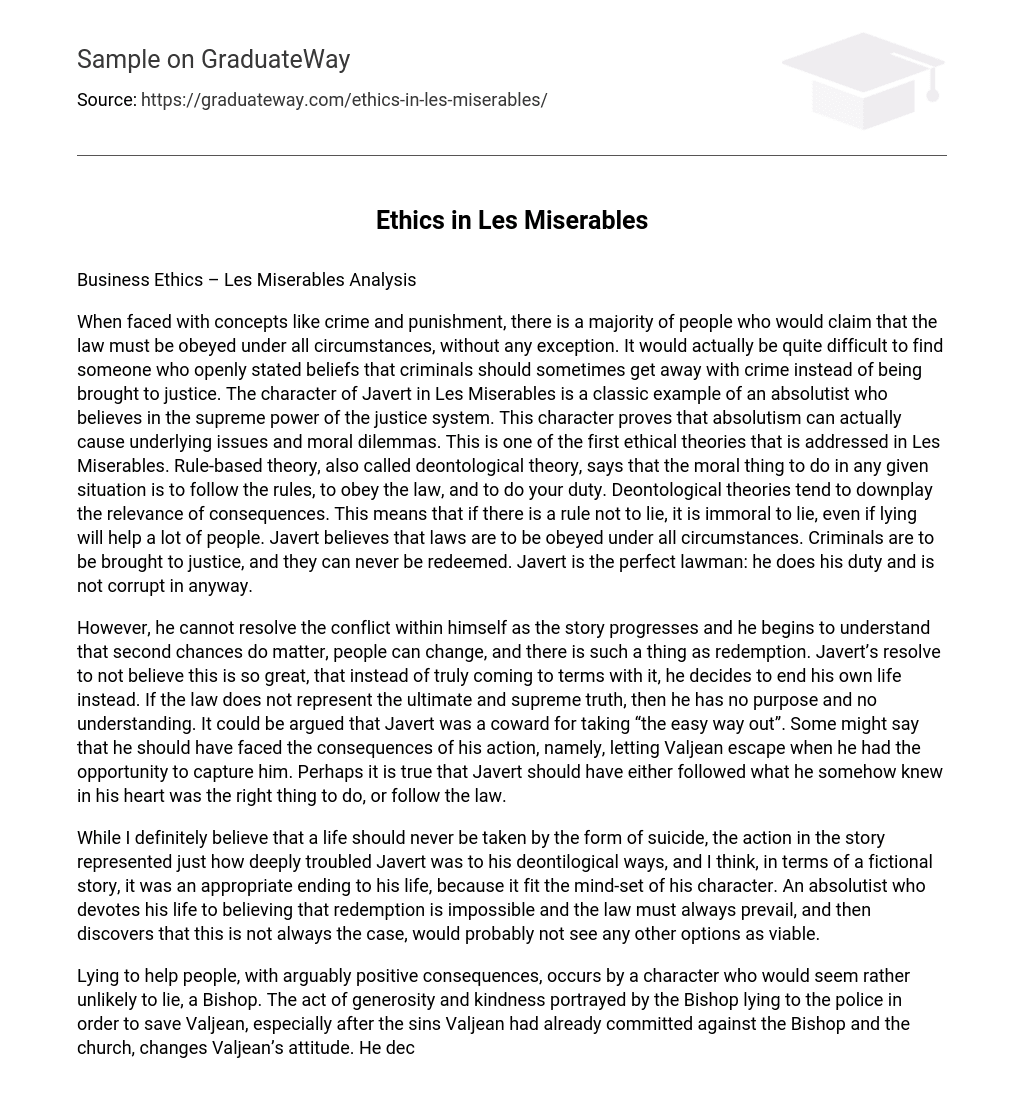Regarding concepts such as crime and punishment, most individuals contend that the law must always be followed, with no exceptions. It would be difficult to find someone who openly supports the idea that criminals should occasionally evade punishment rather than face consequences.
The persona of Javert in Les Miserables exemplifies a quintessential instance of an absolutist individual who upholds the sovereignty of the justice system. Javert’s existence in the narrative highlights the notion that absolutism can potentially engender fundamental complications and ethical predicaments. This ethical dilemma constitutes one of the initial theories expounded upon in Les Miserables. The doctrine of rule-based theory, also referred to as deontological theory, asserts that the morally correct course of action in any circumstance entails adhering to regulations, upholding the law, and fulfilling one’s obligations.
Deontological theories emphasize the unimportance of consequences. Therefore, if there is a rule against lying, it is considered immoral to lie, even if lying could be beneficial for numerous individuals. Javert strongly adheres to the idea that laws should be followed without exception. Criminals must face legal consequences, without any possibility of redemption. Javert epitomizes the ideal law enforcement officer, diligently fulfilling his duty and remaining incorruptible.
However, as the story progresses, Javert cannot resolve the conflict within himself. He comes to realize that second chances are important, people can change, and redemption is possible. Despite this, Javert is determined to not believe in these ideas. Instead of facing this truth, he chooses to end his own life. For him, if the law does not embody the ultimate and supreme truth, then life loses all meaning. One could argue that Javert is cowardly for choosing to take “the easy way out”.
Some argue that Javert should have accepted the repercussions of his actions, specifically, enabling Valjean’s escape when he had the chance to apprehend him. Maybe Javert should have either heeded his inner sense of right and wrong or adhered to the law.
Although I firmly believe that suicide should never be an option to end one’s life, the portrayal of Javert’s desperate act in the story is a testament to his profound internal struggles and unwavering commitment to his rigid moral code. From a fictional standpoint, his tragic demise was fitting as it aligned with the mindset of his character. As an absolutist who fervently believes in the impossibility of redemption and the supremacy of the law, realizing that these beliefs can be challenged would likely leave him with no other perceived alternatives.
The Bishop, an unlikely character, engages in a seemingly positive act of lying to assist people. Despite being deceived by Valjean and experiencing sin against himself and the church, the Bishop’s generous and kind act of lying to the police in order to save Valjean transforms Valjean’s perspective. This event leads Valjean to choose a life of redemption.
The Bishop, symbolizing Christ and the Church, displays magnanimity and nobility, although his ethical behavior is questionable. Despite lying to the police, his action of saving Valjean’s life serves as a catalyst for the multitude of positive choices that Valjean makes thereafter. While Valjean occasionally relies on utilitarian reasoning in his ethical decision-making, he predominantly embodies a virtue-based approach to ethics.
When considering ethics, different approaches can be taken. A deontological approach focuses on the law and what it dictates. In contrast, a utilitarian approach seeks to determine how one can achieve the greatest good. However, a virtue-based approach considers the impact of actions on character development and personal growth. It recognizes that individuals undergo transformations over time based on their actions.
Virtue ethics prevents hasty judgments of people. Valjean’s moral dilemmas and search for the best course of action are recurring themes in the story. The story as a whole demonstrates the intricate and untidy nature of ethics. Recognizing the complexity of ethics empowers individuals to extend compassion to others based on lessons from past encounters. For instance, Valjean can empathize with Fantine, who resorts to prostitution to support her daughter.
Valjean’s heart is filled with pain for the prisoner who was caught stealing and thought to be him. He deeply loves Marius for recognizing and appreciating all the beautiful qualities of Cosette. Valjean is even prepared to show respect for Javert’s authority and surrender himself to the law. Every ethical dilemma encompasses numerous complexities.
If we focus solely on the right or wrong actions in different situations, we fail to grasp the true essence of ethics. Ethics revolves around personal growth and being a virtuous individual. It involves learning from both achievements and errors. While rules are vital, we must also consider the consequences of our actions. Ideally, these two elements should harmoniously guide us towards leading a morally upright life.





